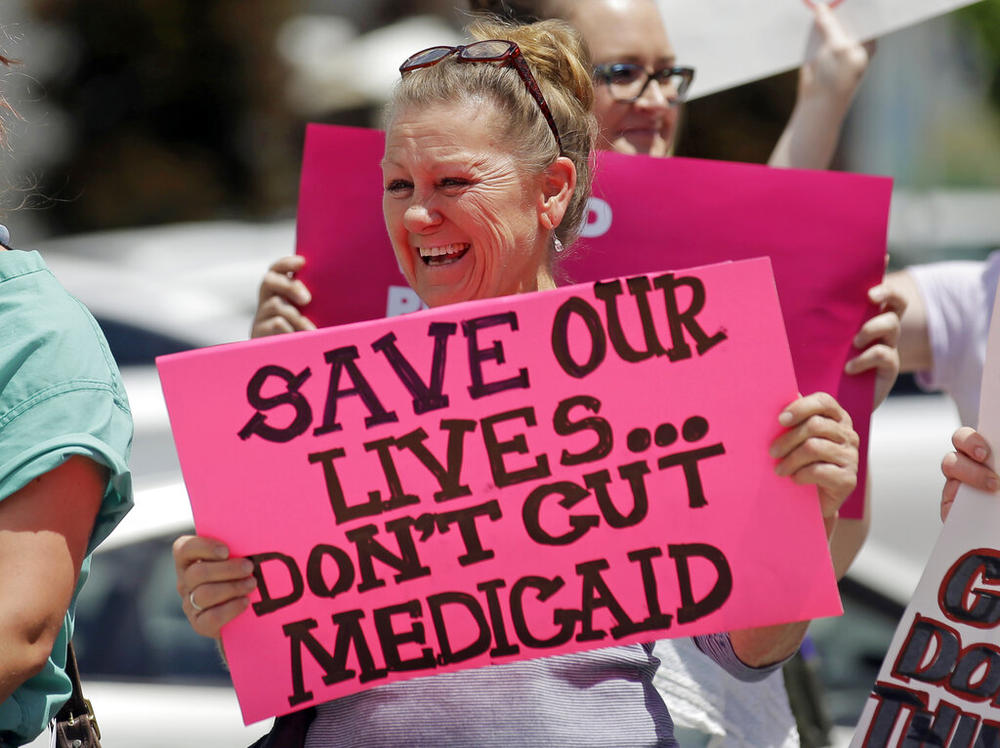
Caption
In this June 27, 2017 file photo, protesters block a street during a demonstration against the Republican bill in the U.S. Senate to replace former President Barack Obama's health care law.
Credit: AP Photo/Rick Bowmer, File
LISTEN: A District Court judge ruled last week that Georgia can move forward with its waiver plan rather than fully expand Medicaid. But some say this will leave many of the state’s poorest people without coverage. GPB’s Ellen Eldridge reports.

In this June 27, 2017 file photo, protesters block a street during a demonstration against the Republican bill in the U.S. Senate to replace former President Barack Obama's health care law.
For 10 years, Georgia state leaders have continued to block access to affordable health coverage via Medicaid to almost 600,000 Georgians, Knetta Adkins with Georgians for a Healthy Future said Thursday.
"And in that time, we have seen uninsured Georgia adults, parents and low-wage workers left disappointed over their inability to meaningfully participate in the Georgia health care system," she said.
Gov. Brian Kemp first unveiled in late 2019 a partial Medicaid expansion that would extend coverage to about 50,000 new people who make no more than the $12,500 federal poverty level, as long as they complete 80 hours of work, job training or other qualifying activity each month.
They would also have to pay monthly premiums.
The governor's office previously called the approach a "conservative reform" that reflects the state's values as a place that "honors work" and "champions individual responsibility."
"This waiver was a well-considered effort to offer a path to health coverage for low-income Georgians in a better way than traditional Medicaid — exactly the kind of demonstration project that Section 1115 of the Social Security Act is meant to encourage," Kyle Wingfield, president and CEO of the Georgia Public Policy Foundation, said in a statement.
But the Biden administration raised concerns over pandemic-era disruptions that could make it more difficult for people to satisfy the work requirement to maintain coverage, undermining the Medicaid program’s mission to promote coverage for those eligible.
In early 2021, the Centers for Medicare and Medicaid Services told Georgia officials the agency was reconsidering its approval and, in December 2021, CMS rescinded its approval, leading the state to sue CMS the following month.
Judge Lisa G. Wood ruled Friday that the federal government’s decision to take back approval for key eligibility requirements was unlawful, calling the move “arbitrary and capricious.”
Adkins said if Georgia moves forward with its waiver plan rather than fully expanding Medicaid, many of the state’s poorest people would be left without health care coverage.
"It would be unreasonably difficult or impossible for many individuals to meet the community engagement requirement approved in this waiver, which would significantly compromise the waivers effectiveness in promoting coverage for its intended beneficiaries," Adkins said. "Essentially, this could prevent Georgians from accessing care and reaching their optimal level of health."

The state of Georgia is getting another “F” on the latest March of Dimes report card related to maternal mortality and infant care.
Eve Byrd with the Carter Center said the waivers' proposed requirements are a step backward for the state, which already ranks poorly for many health-related issues including maternal care.
To require people with mental health conditions to work in order to receive health care — when they're at the poverty level already — is really quite absurd, Byrd said, adding that no one expects to get sick, be it with cancer or depression.
The Carter Center said in its statement that people in Georgia with mental health and substance use disorders "need access to health insurance first, so that they can stabilize their conditions and become capable of holding a steady job to support themselves in the long term."
Byrd said about 20% of the population faces these health issues.
"It's not friendly to the general population, and it's certainly not friendly to those who every day are trying to receive the health care they need for their chronic disability," Byrd said.
A March Of Dimes study found a significant number of counties in Georgia do not have an obstetric hospital and do not offer any obstetric care.
“A significant number of counties in Georgia are maternity care deserts, have no real support for women who are pregnant or have very limited care,” March of Dimes President Stacy Stewart said. “No OB-GYNs, no certified nurse midwives and no birthing centers.”
Medicaid expansion could help women access affordable, essential preventive and primary care and wellness services, such as gynecological tests and screenings and additional pre- and post-natal care, which are intended to improve their health outcomes, Adkins said.
"Our budget is a snapshot of our morals and values, and we as Georgians need to show people where we stand."
Georgia Equality discovered that through full Medicaid expansion, currently uninsured people enrolled in the AIDS Drug Assistance Program could be moved to the Medicaid program, where they would not only be eligible to receive all the services available but would also be eligible to receive additional wraparound services not available under the AIDS Drug Assistance Program or its companion federal program, the Ryan White Program.
As a result of moving 55% of Ryan White clients to the Medicaid program, approximately $53.7 million in Ryan White funding would be available to serve non-Medicaid-eligible HIV positive Georgians who are not currently receiving services, Executive Director Jeff Graham said.
"It makes financial sense to expand Medicaid, and it makes critical sense for the health care infrastructure of our state," Graham said.
People are in desperate need of Medicaid expansion, and this election year will be critical, he said.
"It's critical that we ask elected officials at all levels where their stand on this is, and push back if they say that this is too expensive to do," Graham said. "I would argue, as an advocate, it's far too expensive to not do this."
Additionally, the 2023 budget presents an opportunity to use unprecedented resources, Georgia Budget and Policy Institute Senior Policy Analyst Leah Chan said, noting that state revenue collections continue to significantly outpace spending, adding to an already historic level of obligated reserves available above the state's revenue shortfall reserve.
And yet in fiscal year 2023, the state plans to spend approximately $121 less per resident, an aggregate of about $1.3 billion less than it did before the Great Recession, Chan said.
"One result of this failure to fully invest in Georgians is that we have some of the highest uninsured rates in the country and some of the lowest scores in terms of health system performance," Chan said. "Our budget is a snapshot of our morals and values, and we as Georgians need to show people where we stand."
The state is missing out on potentially billions of federal dollars, millions in increased state and local tax revenues, and tens of thousands of new jobs thanks to new financial incentives offered under the American Rescue Plan, Chan said.
"Expanding Medicaid is an even better deal and an economic imperative for Georgia," Chan said. "Medicaid expansion would not just benefit Georgia's economy at large. It could also impact individual families."